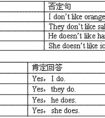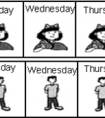Ilivenearschool,soIgotoschoolbybus.[ ]A.alwaysB.neverC.usually-六年级英语
We're not exactly on intimate terms, but we see each other fairly often.
虽算不上关系密切,但还常见面。
注:有时也可不带修饰语,但主要见于否定句或疑问句。 如:
He writes to me often. 他经常给我写信。
Do you come here often? 你常来这儿吗?
I don’t come here often. 我不常来这儿。
3. usually有时也用于句末,其前不用修饰语。
I’m not late, usually. 我通常不迟到。
I get paid on Fridays usually. 我通常在星期五领工资。
4.seldom 一般不用于句末,除非其前带有only,very等修饰。
We go out very seldom. 我们绝少外出。
I play basketball very seldom indeed. 我很少打篮球。
5. always一般不用于句末,偶尔用于句末,此时它不表法“总是”,而表示“永远”。
I’ll love you always. 我将永远爱你。
另外,有时用于句末是因为句子有所省略的缘故。
Generally they walked together on Sunday, but not always.
他们一般在星期日一起散步,但并不总是如此。
句中的but not always=but they didn’t always walk together on Sunday。
频度副词位于句首的用法:
1. sometimes常可用于句首。
Sometimes she comes late. 有时她来得晚。
Sometimes she didn’t agree with me. 有时她和我意见不一致。
Sometimes we get a lot of rain in August. 有时在8月份雨水很大。
2. often用于句首时,通常表示强调,且其前一般有quite, very修饰。
Very often he comes in late. 他常常迟到。
Quite often the phone rings when I’m in the bath. 电话经常在我洗澡时响。
3.usually有时也用于句首,其前不用修饰语。
Usually I get up early. 我平时起得早。
Sometimes he comes by bus, but usually he comes by taxi.
有时他坐公共汽车来,不过他通常还是打的来。
Usually cooking pots have two small handles but pans have one long handle.
通常地深底煮锅有两只把手而平底锅只有一个长长的把手。
4.always一般不用于句首,除非是用在祈使句中。
Always remember this. 请时刻记住这一点。
Always look in the mirror before starting to drive. 一定要先看看反光镜再开车。
另外,never也可用于祈使句的句首。
Never tell him the news. 千万不要告诉他这消息。
Never ask her about her marriage. 决不要问她结婚的事。
5.在正式文体中,表示否定意义的副词seldom, never可位于句首,但此时其后要用倒装语序。
Seldom has there been such a happy meeting. 过去很少有过这样愉快的会议。
Never did he think the book would be finished so soon. 他可没想到这本书会这么快看完
另外,once a year (每年一次), twice a week (每周两次), three times a day (一天三次), every Saturday afternoon(每星期六下午)等,
这些时间状语也表示频率,它们可以和频度副词用在同一个句子中,表达上没有重复。如:
We usually go to the cinema four times a month. 我们通常一个月看四次电影。
考点名称:介词
- 介词:
是用来表示它后面的名词(代词)或起名词作用的短语、从句与句中其他成分之间的关系。
介词是英语中很活跃的词,一般置于名词之前。它常和名词或名词性词语构成介词短语。
同一个介词常和不同的词语搭配形成固定搭配,表示不同意义。 介词分类:
一、表示地点位置的介词
(1)at, in, on, to, for
at 表示在小地方;表示“在……附近,旁边”。
in 表示在大地方;表示“在……范围之内”。
on 表示毗邻,接壤,“在……上面”。
to 表示在……范围外,不强调是否接壤;或“到……”。
(2)above, over, on 在……上
above 指在……上方,不强调是否垂直,与below相对;
over 指垂直的上方,与under相对,但over与物体有一定的空间,不直接接触。
on 表示某物体上面并与之接触。
例:The bird is flying above my head. 小鸟在我的头上飞。
There is a bridge over the river. 在河上有一座桥。
He put his watch on the desk.他把他的表放在了桌子上。
(3)below, under在……下面
under 表示在……正下方
below 表示在……下,不一定在正下方
例:There is a cat under the table. 桌子底下有一只猫。
Please write your name below the line. 请在横线下写上你的名字。
(4)beside,behind beside 表示在……旁边
behind 表示在……后面
二、表示时间的介词
(1)in,on,at在……时
A、in表示较长时间,如世纪、朝代、时代、年、季节、月及一般(非特指)的早、中、晚等。
如:inthe1950s, in1989, insummer, inJanuary, inthemorning等。
B、on 表示具体某一天及其早、中、晚。
如:on May 1st, on Monday, onNew Year’s Day, on a cold night in January, on a fine morning, on Sunday afternoon等。
C、at 表示某一时刻或较短暂的时间,或泛指圣诞节,复活节等。
如:at 3:20, at this time of year, at the beginning of, at the end of, at the age of, at Christmas, at night, at noon, at this moment等。
(2)after在……之后 “after+一段时间”表示过去的一段时间以后;
“after+将来的时间点”表示将来的某一时刻以后。
三、其它常用介词
(1)about关于,附近,大约,周围,随身.
I have bought a book about Shakespearean. 我买了一本有关莎士比亚的书。
There are about fifteen trees in the picture. 大约有十五棵树在图片里。
(2)across横过,对面,交叉,在……的对面
Can you swim across the river? 你能游过河吗?
We live across the street. 我们住在街的对面。
(3)along沿着,顺着.
They are walking along the river. 他们沿着河行走。
(4)by 被……,在……的近旁,在……之前,不迟于,以……为手段。
The class room was cleaned by the students. 教室由学生们打扫干净了。
Miss Lucy came to China by air. 露西小姐是乘飞机来中国的。
(5)for为……,因为……,至于……。
He works for this company. 他为这家公司工作。
She came back to the classroom for she had lef the books in the class room. 她返回到教室是因为把书留在了那里。
(6)from从……,来自……,因为……
Where are you from? 你是哪里人?
He diedf rom an accident. 他死于一场事故。
(7)of……的,属于……
This is a map of China.这是一张中国地图。
(8)with使用、和……在一起
We write with a pen. 我们用笔写字。
- 最新内容
- 相关内容
- 网友推荐
- 图文推荐
| [家长教育] 孩子为什么会和父母感情疏离? (2019-07-14) |
| [教师分享] 给远方姐姐的一封信 (2018-11-07) |
| [教师分享] 伸缩门 (2018-11-07) |
| [教师分享] 回家乡 (2018-11-07) |
| [教师分享] 是风味也是人间 (2018-11-07) |
| [教师分享] 一句格言的启示 (2018-11-07) |
| [教师分享] 无规矩不成方圆 (2018-11-07) |
| [教师分享] 第十届全国教育名家论坛有感(二) (2018-11-07) |
| [教师分享] 贪玩的小狗 (2018-11-07) |
| [教师分享] 未命名文章 (2018-11-07) |


![I_________ hiking.[ ]A.oftengoB. gooftenC. oftenam-五年级英语](http://www.00-edu.com/d/file/ks/4/1/40/2019-08-19/smalle9a6cc00549ea1d7a9ed730fb2fa1a511566228356.gif)

